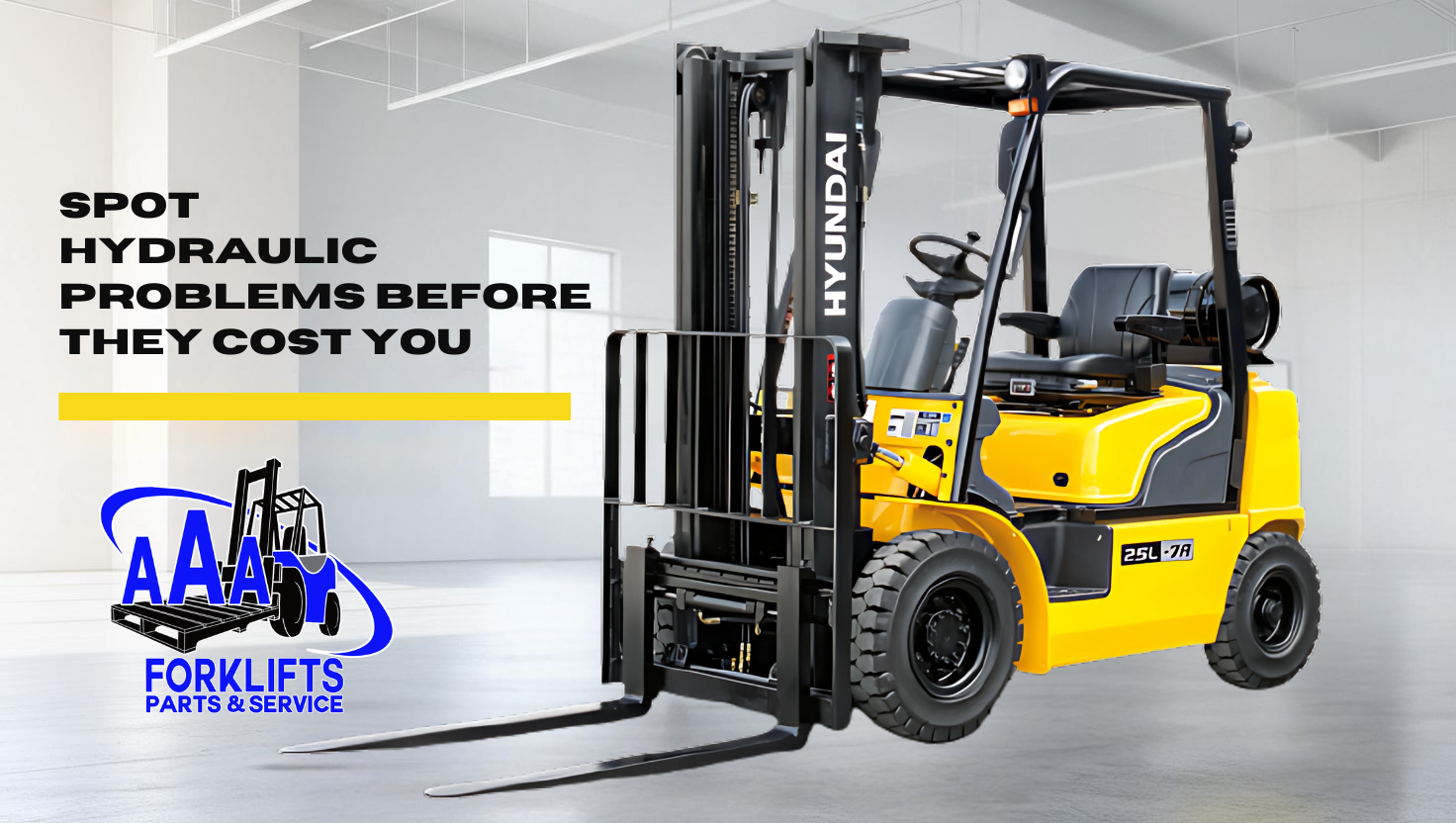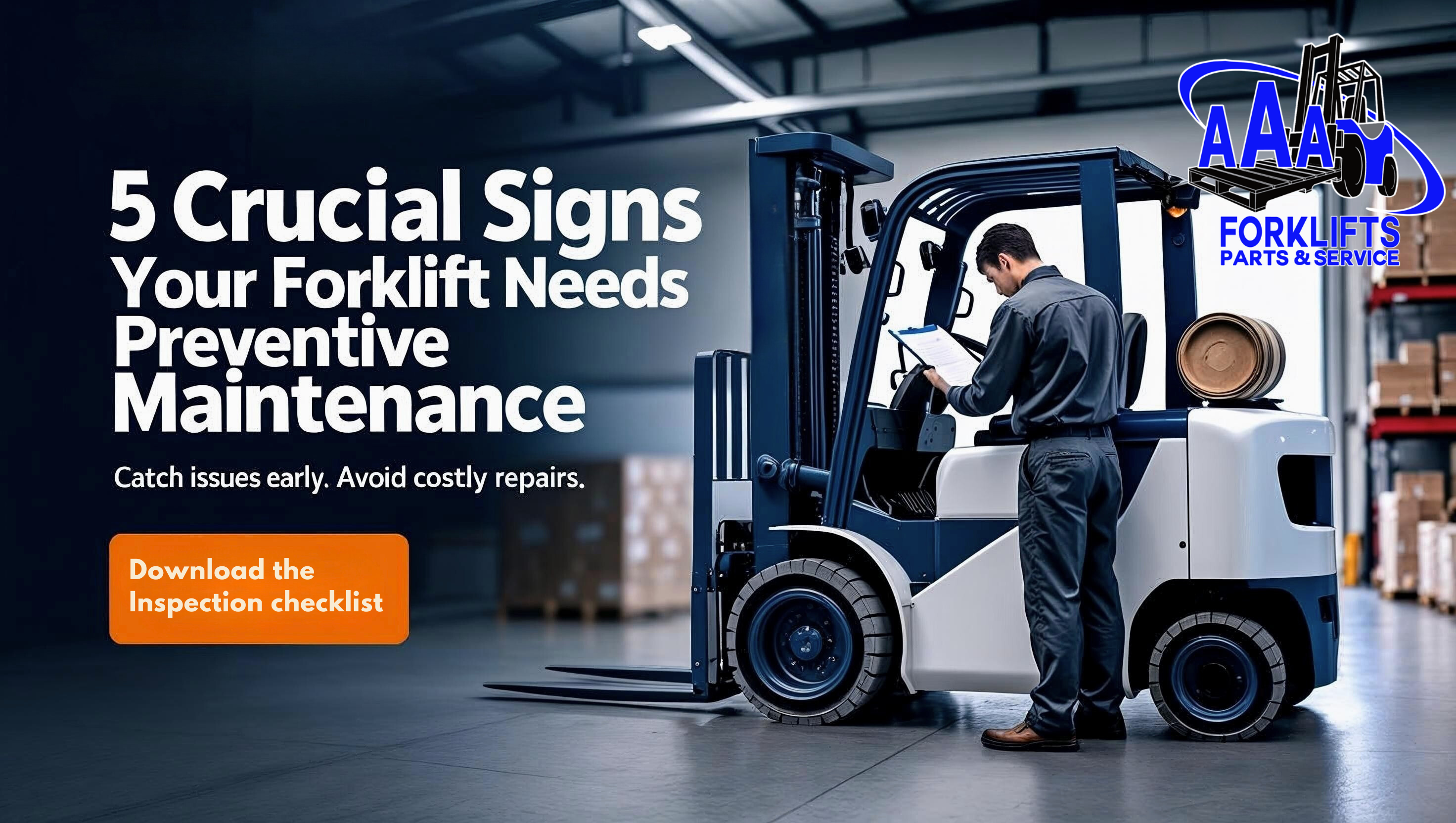Forklift hydraulic failure doesn't happen overnight — and neither does the damage it can cause. If you operate any lift equipment, spotting problems early in your hydraulic system could mean the difference between a quick fix and thousands of dollars in downtime. Whether you're dealing with leaking hoses, worn hydraulic cylinders, or an unreliable pump, knowing what to look for is step one.
Hydraulic systems are essential for forklift performance — controlling lift, tilt, and steering. Because they rely on precise fluid pressure, even minor leaks or internal wear can cause instability and equipment failure. Learning to recognize early warning signs gives operators and maintenance staff an edge in preventing costly breakdowns.
Why Early Detection Matters
Hydraulic systems operate under extreme pressure. A small leak today could lead to a burst hose, damaged valve, or complete loss of lifting power tomorrow. Regular inspections and operator awareness can catch these issues early, allowing timely maintenance before they escalate into safety hazards or lost productivity.
For companies that rely on forklifts daily, avoiding downtime is mission-critical. Equipment out of service can disrupt workflow, increase labor costs, and delay orders. That’s why early detection of hydraulic issues — and quick response — is so important.

Most Common Signs of Forklift Hydraulic Issues
Here are the most common signs that your forklift may be experiencing hydraulic problems:
- Fluid Leaks: Puddles or streaks under the forklift, especially after long use, usually indicate damaged seals or worn-out hoses.
- Loss of Lifting Power: If the forks won’t lift or lower smoothly, low fluid, internal pump wear, or valve issues could be the cause.
- Erratic or Jerky Movements: This may be a sign of air in the hydraulic lines, contaminated fluid, or sticky valves.
- Whining or Grinding Sounds: These can signal cavitation, clogged filters, or a failing hydraulic pump.
- Fork Drift: If the forks slowly lower on their own, it may indicate bypassing seals or a leaking cylinder.
- Visible Wear or Damage: Hoses with cracks or bulges, rods with pitting, or corrosion on couplers can all be signs of failure to come.
Weekly Visual Inspection Checklist
Preventive maintenance starts with simple, regular inspections. Here’s what forklift operators and service techs should look for:
- Check hydraulic fluid levels at the start of each shift.
- Inspect hoses for swelling, cracking, or wear near fittings.
- Check chrome rods for pitting, rust, or leaks at the seals.
- Look for dirt, water, or milky discoloration in the hydraulic fluid.
- Test lifting and lowering — movements should be smooth and consistent.
- Watch for uncontrolled or sudden fork drift when idling.
Root Causes Behind Common Hydraulic Problems
Understanding the root cause behind hydraulic issues helps narrow down repair strategies. Here are some common culprits:
- Seal Failure: Caused by wear, contamination, or age — usually seen in cylinders and valves.
- Contaminated Fluid: Dirt, water, or air in the system degrades performance and damages internal components.
- Hose Deterioration: Over time, hydraulic hoses can dry out, swell, or burst under pressure.
- Pump Wear: Continuous operation or poor maintenance can erode pump components and reduce flow rates.
- Incorrect Pressure: Malfunctioning relief valves or incorrect settings can overload the system.
When to Seek Professional Hydraulic Services
Not every hydraulic problem can be resolved in-house. If issues persist or affect safety and performance, it’s best to consult a qualified hydraulic service technician. Professionals use pressure gauges, infrared imaging, flow meters, and fluid analysis to diagnose problems precisely — often avoiding guesswork and repeated downtime.
Timely repairs from a certified hydraulic service provider ensure safety compliance, extend the life of components, and reduce operating costs in the long term.
Hydraulic Service Options: What’s Typically Offered?
Forklift hydraulic systems require specialized services to stay operational and safe. These typically include:
- Hydraulic hose fabrication and replacements
- Cylinder resealing, rebuilds, and rod rechroming
- Hydraulic pump repair and replacement
- Valve resealing and diagnostics
- Filter replacements and fluid flushing
- Preventive maintenance and pressure checks
Hydraulic Services at AAA Forklifts
AAA Forklifts provides complete hydraulic repair services to customers across Orlando, Tampa, Central Florida, and Raleigh, NC. Our expert team handles everything from on-site hydraulic system repairs to full hydraulic cylinder rebuilds and pump diagnostics.
We service all major forklift brands and also repair hydraulic systems on liftgates, aerial platforms, and industrial equipment. Our shop builds custom hydraulic hoses to fit any make or model, and we offer rod rechroming, valve resealing, and emergency on-site diagnostics.
Whether you need basic hydraulic servicing or full rebuilds, AAA Forklifts is your partner in minimizing downtime and keeping your equipment working at peak performance.
Real-World Example: Diagnosing and Fixing a Leak On-Site
A Central Florida warehouse manager recently reported jerky lifting and minor hydraulic fluid loss. Our inspection revealed a worn rod seal and pitted chrome on the cylinder. The forklift never had to leave the job site. We rebuilt the cylinder, performed a full fluid flush, and had the lift back in service in under 4 hours. The quick diagnosis and mobile repair prevented extended downtime and saved the customer from a costly equipment rental.
Glossary of Common Hydraulic Terms
- Hydraulic Cylinder: A mechanical actuator that uses pressurized fluid to produce linear motion.
- Rod Rechroming: The process of resurfacing hydraulic cylinder rods to eliminate pitting and extend life.
- Pump Cavitation: The formation of air bubbles in hydraulic fluid that can damage pump components.
- Seal Kit: A set of replacement seals used to rebuild leaking or worn hydraulic components.
- Hydraulic Hose: Flexible tubing used to carry fluid between different parts of the hydraulic system.
Looking for Expert Hydraulic Support?
If you're experiencing hydraulic problems or want to prevent them before they start, AAA Forklifts offers diagnostics, cylinder rebuilds, pump repairs, rod rechroming, and custom hose fabrication. We proudly serve Orlando, Tampa, Central Florida, and Raleigh, NC — on-site and in-shop.
🚨 Need help now?
AAA Forklifts offers 24/7 emergency hydraulic repair services to get your forklift back up and running — fast. Whether you're in Central Florida or Raleigh, NC, our expert technicians bring diagnostics and repairs directly to your site.
📍 Orlando, FL: (407) 695-4387
📍 Raleigh, NC: (919) 925-2217
🌐 Website: www.aaaforklifts.com



Deja un comentario
Este sitio está protegido por hCaptcha y se aplican la Política de privacidad de hCaptcha y los Términos del servicio.